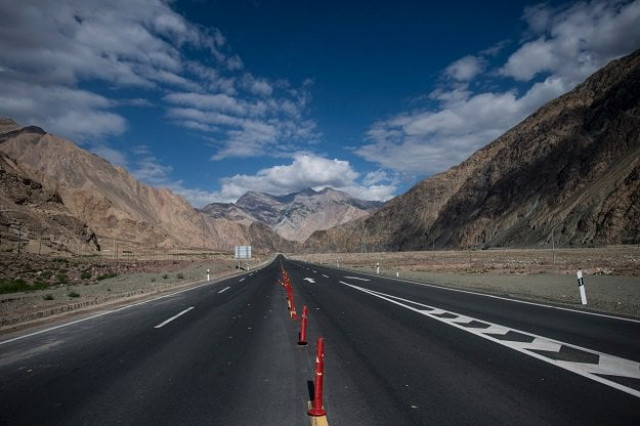CPEC: High-potential sectors identified for investment
PCJCCI official says capital should go towards productive sectors

The China-Pakistan Friendship Highway before the Karakorum mountain range near Tashkurgan in China's western Xinjiang province. PHOTO: AFP
He expressed these views after meeting PCJCCI President Wang Zihai. Afridi urged the organisations working independently for strengthening Pak-China relations to share knowledge regarding the specification of SEZs to be set up by both countries.
He emphasised that it was important to direct investments towards the productive sectors and revealed that the PCJCCI was in contact with Chinese delegations and was well aware of the trends and dynamics in Chinese markets which Pakistan’s industry could cater to.
Pakistan, he said, could create a market for its goods by developing potent sectors through investments in technology and infrastructure.
The PCJCCI president said his organisation was taking initiatives to attract investment from China in eight high-potential sectors including furniture, handicrafts, textiles, fertilisers, cement, glass works, energy and pharmaceuticals.
“These sectors are identified after data sharing by both countries,” he said, adding Pakistan was in dire need of maximum SEZs to tackle the economic challenges being faced for decades.
“These special economic zones will strengthen the industrial base, boost economic growth and protect the national economy from external shocks such as global recessions,” Afridi said, highlighting the role played by SEZs in helping China integrate into the global economy.
“After a detailed analysis of current market needs, strengths and weaknesses of Chinese and Pakistani markets, the PCJCCI has delineated various sectors in which the formation of joint industrial parks and SEZs would do wonders,” he said.
Zihai said lack of cold-chain logistics and processing facilities were causing 50% wastage of agricultural products in Pakistan during harvest and transport. Chinese expertise and investment would help tackle the situation, he emphasised.
Published in The Express Tribune, August 5th, 2017.
Like Business on Facebook, follow @TribuneBiz on Twitter to stay informed and join in the conversation.


















COMMENTS
Comments are moderated and generally will be posted if they are on-topic and not abusive.
For more information, please see our Comments FAQ